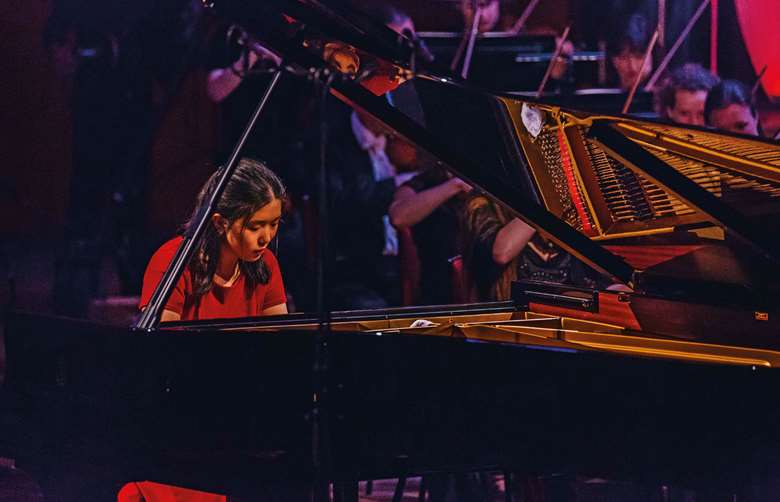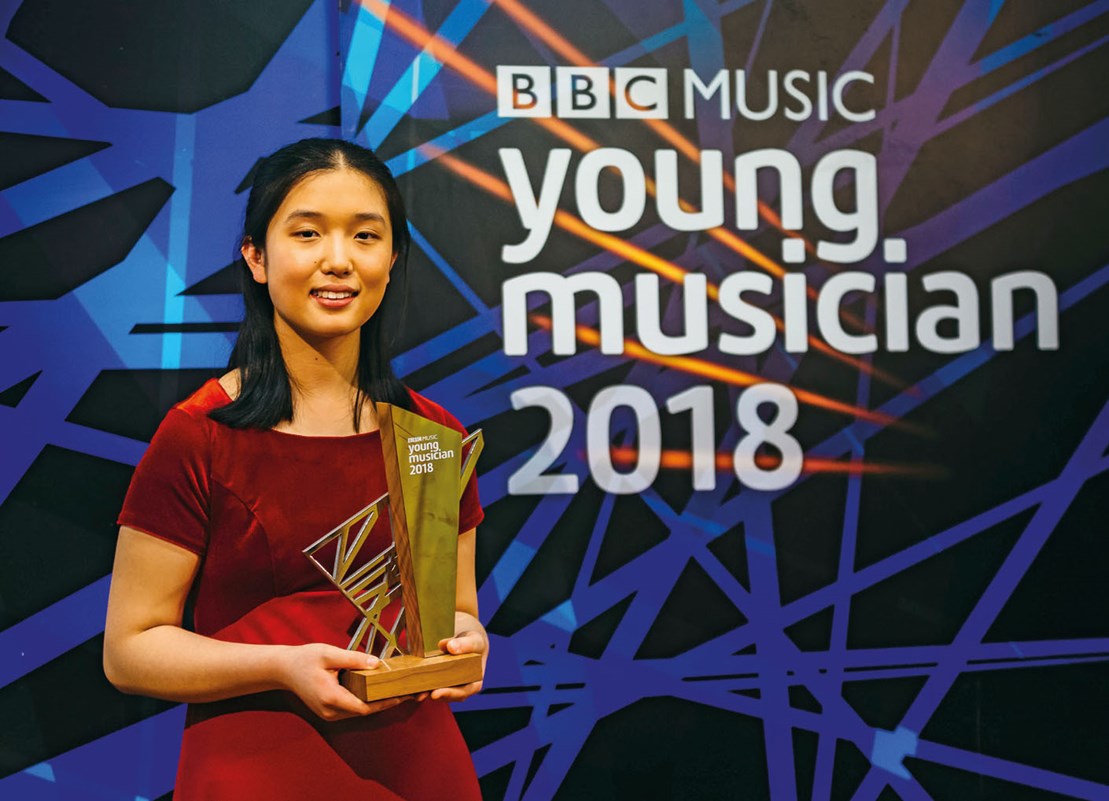Aiming high: BBC Young Musician winner
Claire Jackson
Thursday, November 1, 2018
In the last of MT's three-part series of BBC Young Musician 2018 interviews, we meet Lauren Zhang, overall winner of this year's competition. The Birmingham-based pianist talks to Claire Jackson about studying and STEM.

Prokofiev's second piano concerto is a mesmeric kaleidoscope of shifting colours. The extended cadenza that appears mid-way through the first movement is notoriously complex, demanding both virtuosic prowess, strength and sensitivity. The composer dedicated the work to a colleague who had committed suicide; the underlying darkness and abstract melodies make this a particularly challenging piece to perform effectively.
It was all the more impressive, then, that Lauren Zhang chose to play Prokofiev's masterpiece in the 2018 final of BBC Young Musician of the Year, rather than a piano competition staple such as the Grieg concerto. Zhang's watertight technique and characterful playing – alongside the superb City of Birmingham Symphony Orchestra, conducted by Mark Wigglesworth – astonished audiences and judges alike. Despite the stiff competition from her counterpart finalists (saxophonist Robert Burton and cellist Maxim Calver, featured in Music Teacher Vol. 97, Nos. 8 and 10 respectively), the then 16-year-old Zhang scooped first place.
The subsequent months have seen ‘lots of exciting new opportunities’ arise for the pianist – including further BBC gigs. ‘I played in the BBC Young Musician Prom, and on Proms Extra, and also Proms in the Park,’ says Zhang, ‘I'm really grateful and feel very lucky to be in this position.’ We speak over the phone at teatime, once Zhang has finished sixth-form studies for the day. She's just started her A-levels: ‘I'm studying Maths, Further Maths, Chemistry and Physics,’ says Zhang. ‘It is a lot of work.’ It is a surprise to learn that music is not part of the qualification quartet, but Zhang is also at Royal Birmingham Conservatoire's junior department. The elite music school is thrilled to have Zhang as a student: Julian Lloyd Webber, head of Birmingham Conservatoire, told the Guardian: ‘Having spent a lifetime making music with some of the world's finest musicians, I can honestly say that Lauren is up there with the best – she is a total phenomenon.’
Birmingham Conservatoire has recently undergone an expensive makeover, and its £57m building boasts five new public performance spaces, including a 500-seat concert hall, a 150-seat recital hall and a 100-seat organ studio (see pages 54 to 55 for details about the conservatoire's répétiteur course). The site also includes The Lab, a flexible black-box studio; more than 70 teaching practice rooms; and the 80-seat Eastside Jazz Club, the first permanent jazz space in any UK conservatoire. ‘The new facilities are amazing,’ Zhang enthuses. ‘The concert hall is really high-tech – you can even adjust the acoustics.’ The pianist also plays the violin to a high level, although she's recently stopped taking lessons as she ‘didn't have time to practise the violin, and I didn't want to disappoint my teacher too much.’ With a schedule that includes weekend chamber music, fencing, and, presumably, homework, that seems entirely understandable.
‘I used to learn violin with Sam Mason,’ Zhang continues, ‘My teachers are all so inspiring. I study piano with Robert Markham, who was also a finalist in the BBC competition [BBC Young Musician, in 1986] and the Tchaikovsky competition.’ [The Moscow-based International Tchaikovsky Competition, which takes place every four years and is one of the world's most prestigious piano events.] Would she consider following further in Markham's footsteps, and entering the Tchaikovsky, too? ‘Maybe,’ she says, sensibly not giving anything away.

Prizewinner: Zhang with her award © PHOTOGRAPHY COURTESY OF THE BBC
High-profile competition wins need to be handled carefully. There's a delicate balance to strike between utilising a public platform to build a reputation and minimising the risk of burnout. This is a challenge that young professional pianists usually face in their early 20s – the dichotomy between health and achievement is even more pronounced when the successful finalist is still a youthful teenager. But Zhang has her feet firmly on the floor: the handful of concerts she has played since BBC Young Musician have been carefully selected. ‘Overall, it's been really fun,’ she says. ‘For the Prom, I didn't feel that nervous at all, because there were four pianists and we had the music, so it wasn't like there would be any memory mistakes.’
More pressurised, perhaps, was Zhang's performance of the last movement of Tchaikovsky's first concerto, which she played with the BBC National Orchestra of Wales, conducted by Grant Llewellyn, for BBC Proms in the Park – Live from Colwyn Bay. The concert was broadcast on TV and showed Zhang's dexterity in the final flourishes, where the pianist zipped up and down the keyboard with apparent coolness. Her encore, Chopin's Étude in G flat, Op. 10, No. 5 revealed a liquidity that many pianists spend their whole lives working towards.
So who is this rising star? Zhang was born in New Mexico, where she began learning the piano when she was four, adding the violin two years later. Zhang and her family moved to the UK in 2010, and she joined the Royal Birmingham Conservatoire that year, studying with Rebeca Omordia, then moving to work under Markham. She's received guidance from renowned piano pedagogue Christopher Elton, and won first prize at the 15th Ettlingen International Piano Competition for Young Pianists in Germany, as well as the EPTA-UK (see pages 34 to 35) competition. A promising performance career beckons, although Zhang is wisely keeping her options open: ‘I've always been interested in science and maths,’ she says, ‘If I don't do music, I'll do something academic in those fields. I go to a girls’ school that really promotes women in STEM so I am well supported; lots of students are interested in those subjects too.’
I raise the topic of similarities between music and maths. There is currently a renewed interest in how the subjects intersect: the City of London Sinfonia recently curated Bach and the Cosmos, a series of events dedicated to Bach's use of numbers. As part of the programme, Oxford mathematician James Sparks explored the intertwining relationships contained within Bach's compositions. There are numerous anecdotal examples of keyboardists who are also mathematicians: Sparks himself is an accomplished organist, and several members of the Oxford maths department are also pianists. ‘I do know people at school who like maths and are really good at music,’ Zhang muses, adding, ‘but that might just been correlation, not causation.’
Being a pianist can be a solitary undertaking, and Zhang appreciates the collaborative side of chamber music. She has enjoyed meeting her fellow BBC Young Musician participants. ‘I would love to meet up with them again soon,’ she says. ‘We do keep in touch – we follow each other on Instagram.’ Whichever path Zhang chooses, music – and her incredible achievements this year – will always play an important role in her life.

